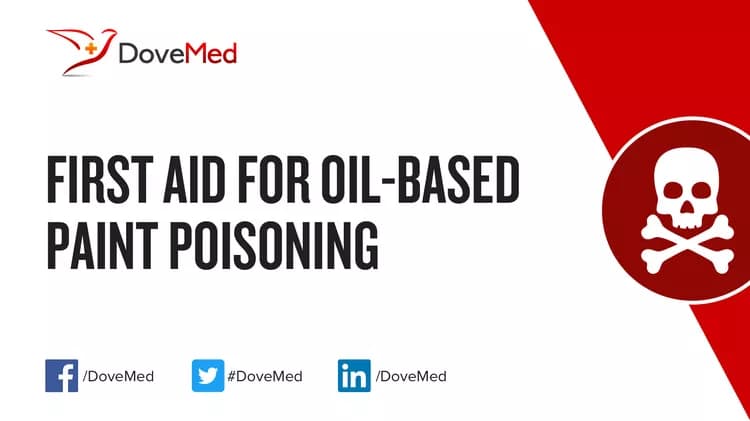What is Oil-Based Paint Poisoning?
- Oil-based paints are used for a variety of paint purposes - from painting wood and concrete surfaces to painting on fabric canvases
- Oil-Based Paint Poisoning is the accidental or intentional intake of the compound
- The condition is diagnosed based upon the clinical history, combination of signs and symptoms, and additional tests (that may include, in some cases, radiological studies and laboratory tests)
Oil-Based Paint Poisoning may be also referred to as Oil-Based Paint Toxicity.
What are the Causes of Oil-Based Paint Poisoning?
- Oil-Based Paint Poisoning is caused by the ingestion (swallowing) of oil-based paint. The paint may also get into the eye, resulting in eye-related symptoms
- This intake could be accidental, or in some cases intentional, to bring self-harm
- Oil-based paints may be homemade or bought from a store. The paint ingredients may include vegetable (poppy, soybean, or linseed oil), pigments (synthetic or obtained from plants), mineral spirits, binders, plasticizers, fillers, and other additives (synthetic resins). Some of these are toxic to humans
Note: The compound can interact with other prescribed or non-prescribed medications in the body. Such interactions may enhance the therapeutic effects of other medications being taken, resulting in undesired side effects.
What are the Signs and Symptoms of Oil-Based Paint Poisoning?
The signs and symptoms of Oil-Based Paint Poisoning can vary from one individual to another. It may be mild in some and severe in others. Several systems of the body, such as the vascular system, digestive system, respiratory system, nervous system, and ENT may be affected.
The signs and symptoms of Acetone Poisoning may include:
- Irritation of the mouth, nose, and eyes, resulting in runny nose and watery red eyes
- Swallowing difficulties; coughing
- Nausea and vomiting
- Diarrhea
- Breathing difficulties; pain on taking breath
- Increased heartbeat
- Skin burns; blister formation
- Numbness and tingling sensation
- Feeling dizzy, lack of coordinated movement
- Confusion and depression
- Low level of alertness; feeling irritated or nervous
- Stomach pain
- Vision abnormalities including blurry vision or partial vision loss
- Loss of consciousness and coma
How is First Aid administered for Oil-Based Paint Poisoning?
First Aid tips for Oil-Based Paint Poisoning:
- Call 911 or your local emergency help number immediately, for emergency assistance
- Call the Poison Control Center at 1-800-222-1222 (or your local poison control center) for further instructions
- Provide them with information such as the compound taken, quantity and time of ingestion, age, weight and general health status of affected individual
- Confirm that the airways are protected; also, ensure breathing and the presence of pulse
- If exposure of the eye has occurred, then wash thoroughly with copious amounts of water. Any paint on skin may be washed away
- Unless instructed by a healthcare professional, DO NOT induce vomiting in the affected individual
- Following an ingestion of the substance, immediately give water or milk to drink
- In case of symptoms that indicate difficulty in swallowing including vomiting or decreased alertness, do not give anything by way of mouth
- Take individual to emergency room (ER) for further treatment
- Always try to take the compound bottle/container to the ER
The emergency medical health professional might perform the following steps towards treating the condition:
- Gastric lavage for elimination of the substance from the stomach (irrigation using special solutions); in case, substantial amounts of the paint is swallowed
- Medically manage symptoms and provide breathing support, if necessary
- Wash eyes repeatedly and thoroughly (irrigation), to eliminate any remaining compound
- Administer laxatives for elimination of the substance from the body
- Administer fluids by an intravenous drip line
Who should administer First Aid for Oil-Based Paint Poisoning?
First aid for Oil-Based Paint Poisoning is administered by healthcare professionals.
- The individual who is affected, or someone near, should call 911 for emergency assistance (or the local emergency number)
- They should also call the poison control center at 1-800-222-1222 (or the local poison control center) and follow instructions
What is the Prognosis of Oil-Based Paint Poisoning?
- The prognosis of Oil-Based Paint Poisoning is dependent on the amount of substance consumed, time between consumption and treatment, severity of the symptoms, as well as general health status of the patient
- If the individual can recover from the symptoms, with appropriate medication and early support within 1-2 days, the outcome is generally good
- In case of severe damage to the internal organs, such as the gastrointestinal tract, lungs, or kidneys, the outcome may be adversely affected and prolonged treatment and time for recovery is expected. In such cases, with severe poisoning, fatalities have been reported
In general, toxicities are common situations in the emergency departments. A majority of the cases are often not fatal, when appropriate treatment is given.
How can Oil-Based Paint Poisoning be Prevented?
Oil-Based Paint Poisoning can be prevented by:
- Always following instructions for usage of any household products
- Keeping any poisonous/hazardous chemicals and other materials out of children’s reach
- Keep all poisons correctly labeled and in suitable storage locations
- Using appropriate protective wear when working with such chemicals
- Being aware of basic first aid steps in case of an emergency (such as inadvertent poisoning)
What are certain Crucial Steps to be followed?
- Call 911 (or your local emergency number) for emergency assistance, if symptoms are life-threatening
- Call Poison Control Center at 1-800-222-1222 (or the local poison control center) and follow the recommend steps
- It would be helpful if the following information is readily available:
- Type, amount and time of consumption of the substance
- Age and weight of the individual
- And, the overall health status of the individual
Related Articles
Test Your Knowledge
Asked by users
Related Centers
Related Specialties
Related Physicians
Related Procedures
Related Resources
Join DoveHubs
and connect with fellow professionals


0 Comments
Please log in to post a comment.